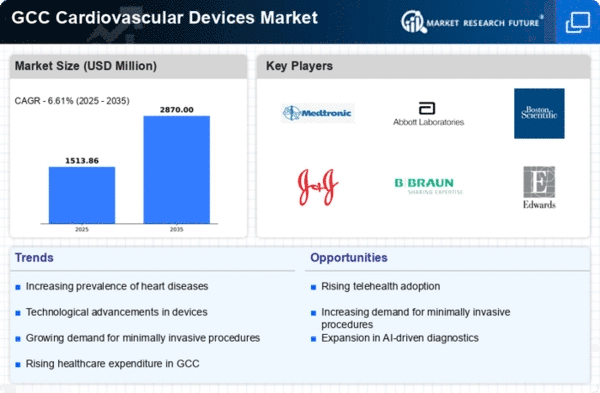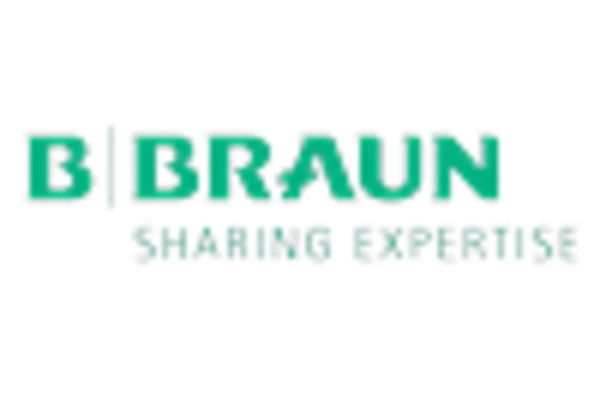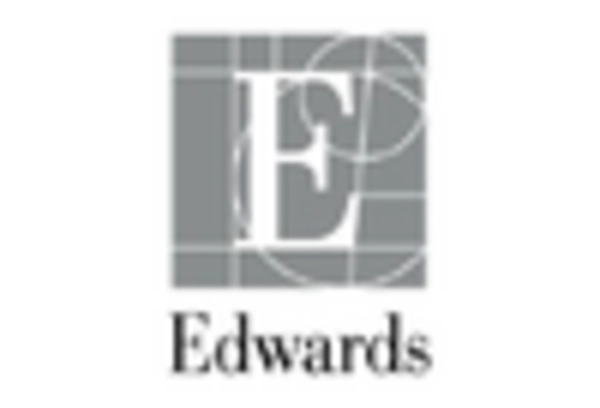Rising Healthcare Expenditure
The increasing healthcare expenditure in the GCC countries is a significant driver for the cardiovascular devices market. Governments are allocating larger budgets to healthcare, aiming to enhance the quality of medical services and infrastructure. This trend is evident in countries like Saudi Arabia and the UAE, where healthcare spending is projected to grow at a CAGR of over 5% in the coming years. Such investments facilitate the procurement of advanced cardiovascular devices, enabling healthcare providers to offer better diagnostic and therapeutic options. As healthcare systems evolve, the demand for high-quality cardiovascular devices is likely to rise, reflecting the commitment to improving health outcomes in the region.
Expansion of Healthcare Infrastructure
The expansion of healthcare infrastructure in the GCC region is a pivotal driver for the cardiovascular devices market. Governments are investing heavily in building new hospitals and upgrading existing facilities to accommodate the growing population and their healthcare needs. This expansion includes the establishment of specialized cardiac care centers equipped with state-of-the-art technology. As a result, the availability of advanced cardiovascular devices is expected to increase, facilitating better access to care for patients. The ongoing development of healthcare infrastructure is likely to create a conducive environment for the growth of the cardiovascular devices market, as more healthcare facilities adopt innovative solutions to enhance patient care.
Growing Awareness and Preventive Healthcare
There is a notable increase in awareness regarding cardiovascular health among the population in the GCC region. Public health campaigns and educational initiatives are emphasizing the importance of preventive healthcare, which is influencing consumer behavior. As individuals become more informed about the risks associated with cardiovascular diseases, there is a growing inclination towards regular health check-ups and early interventions. This shift in mindset is driving demand for cardiovascular devices, as patients seek timely and effective solutions for managing their health. The cardiovascular devices market is likely to benefit from this trend, as healthcare providers respond to the increasing demand for preventive measures and innovative treatment options.
Technological Advancements in Device Design
Technological innovations play a crucial role in shaping the cardiovascular devices market. The introduction of advanced materials, miniaturization of devices, and enhanced imaging techniques have revolutionized the design and functionality of cardiovascular devices. For instance, the development of bioresorbable stents and wearable cardiac monitors reflects the industry's commitment to improving patient care. These advancements not only enhance the efficacy of treatments but also reduce recovery times, which is particularly appealing in the GCC region where healthcare facilities are increasingly adopting cutting-edge technologies. The market is projected to witness substantial growth as manufacturers invest in research and development to create next-generation devices that meet the evolving needs of healthcare providers and patients alike.
Increasing Prevalence of Cardiovascular Diseases
The rising incidence of cardiovascular diseases in the GCC region is a primary driver for the cardiovascular devices market. Factors such as sedentary lifestyles, unhealthy dietary habits, and increasing obesity rates contribute to this trend. According to health statistics, cardiovascular diseases account for a significant portion of mortality in the region, prompting healthcare providers to seek advanced solutions. The demand for innovative devices, including stents and pacemakers, is expected to grow as healthcare systems aim to improve patient outcomes. This increasing prevalence necessitates the adoption of advanced cardiovascular devices, thereby propelling market growth. As the population ages, the burden of cardiovascular diseases is likely to escalate, further driving the need for effective medical interventions in the cardiovascular devices market.
















